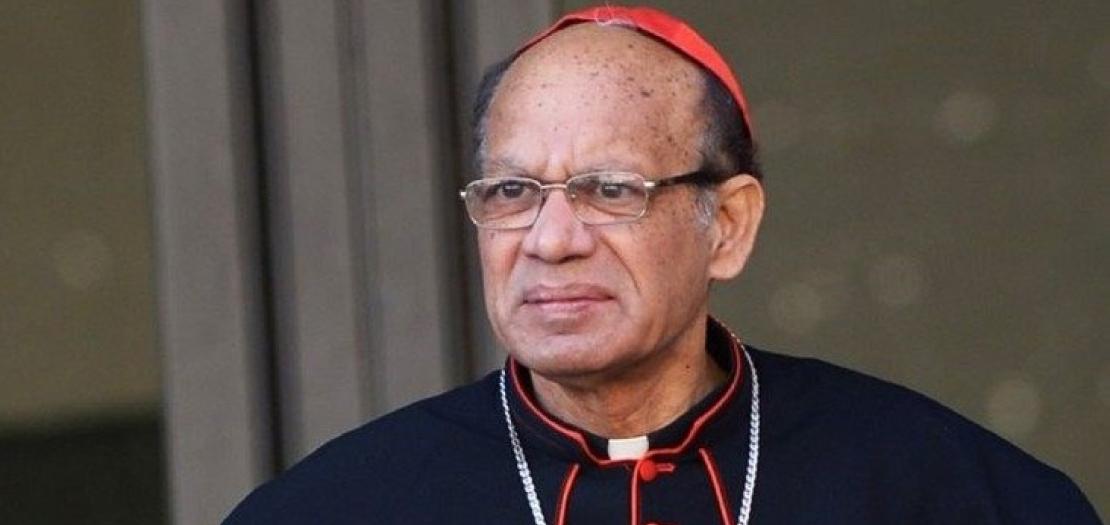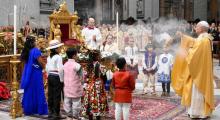Issued by the Catholic Center for Studies and Media - Jordan. Editor-in-chief Fr. Rif'at Bader - موقع أبونا abouna.org

On October 24, Pope Francis published Dilexit nos, the fourth encyclical of his pontificate dedicated to the Sacred Heart of Jesus and the strength of his message for today's wounded world. We publish a commentary about this new document of the magisterium written for AsiaNews by Cardinal Oswald Gracias, Archbishop of Bombay, who stresses its importance for a country like India, where this devotion is widespread among Catholics and is a source of inspiration for the selfless service that the Church provides to everyone, especially those who are poor and relegated to the margins of society.
We are very happy with this encyclical. Catholics are overjoyed to once again have guidance from the Holy Father on the devotion to the Sacred Heart of Jesus. Many houses and families have an enthronement to the Sacred Heart of Jesus and this will give further impetus to encourage people to understand the meaning of the Sacred God’s love for us in our own response to God’s love.
A quick input in the encyclical is how we need to build a relationship with Jesus. The love of Jesus is for the poorest of the poor, caring especially for the marginalized. This relationship is a step towards building peace and harmony. There is so much conflict and strife in the world today and the world needs Peace. In India we value peace so much. We value people and relationships. I think the stress is on relationship, not on structures so much, but on relationships which are so important in caring for others. In that sense, it is a very welcome Encyclical at the right time and for us it will be of help – a spiritual guide for us.
All our charitable works flow from the heart of Jesus. We touch His heart and our hearts are moved and we touch others’ hearts. That is the source of all our charitable works and our attitude towards others. Once you have been touched by Jesus, you cannot be the same again. His heart leads you to others and you are transformed.
The Catholic Church runs about 25,000 educational institutions: schools (15,000), colleges (300), nursing schools (115), hospitals and health clinics (5,000), rehabilitation centers (2,000), technical schools (1,500), medical colleges (6), two universities, apart from engineering colleges and other social and welfare institutions.
All our outreach programs are a response to the call of Jesus, an imitation of Jesus and, most importantly, an outflow of the love of the Heart of Jesus. There is an inescapable duty to make ourselves the neighbor of everyone, irrespective of caste or creed. In his messianic activity, Christ drew increasingly closer to the world of human suffering. ‘He went about doing good’, his actions primarily concerned those suffering and seeking help. This dialogue of action flows from the Sacred Heart of Jesus.
The health mission of the Catholic Church in India plays a vital role in alleviating the pain of the sick and suffering, especially of those who are poor and cannot afford adequate treatment. The Catholic Church has 746 hospitals, 2,574 dispensaries, 70 rehabilitations centers, 107 mental health centers, 61 alternative medicine centers, 162 non-formal health facilities, and 115 medical training centers, including six medical colleges. Along with this, there are 165 leprosy centers, 416 healthcare centers for the aged, 62 centers for tuberculosis and the terminally ill, 67 community care centers for PLHAs, and 60 counselling centers. All of these are works of love, flowing from the Heart of Jesus.
The world is in need of the healing touch – to be cured from our selfishness, lack of care for others and lack of relationships with others. The whole Encyclical Dilexit Nos is based on that.
In India we are very proud that many of our homes are dedicated to the Enthronement of the Sacred heart of Jesus. It is very important for us to once again understand the meaning of the enthronement and to build our personal relationship with Jesus.
In 2020 during COVID, I had led all the bishops of India to entrust ourselves to the Sacred Heart of Jesus and the Immaculate Heart of Mary. That was the time when we felt helpless and confused, and the Act of Consecration of India to the Sacred Heart of Jesus became a source of life and inspiration and gave us encouragement. I feel the Lord inspired me and led all of us to get out of the darkness of the pandemic and go forward in service to the poorest, migrants, the dispossessed, and the elderly and sick and lonely and the Sacred Heart of Jesus was always with us.
This encyclical is calling us out of our individualism and thinking only of ourselves, to reach out to others. Dilexit Nos encourages the dialogue of life in our multi-faith and multicultural milieu; all people strive to live in an open and neighborly spirit, sharing their joys and sorrows, their human problems and preoccupations. No longer inward-looking but outward looking. Indian society has already progressed so much. Our country will benefit a lot from this attitude. Inter-religious dialogue too flows from this.
We want to share the Good News. We want to help others and work with others in an inclusive society. This is true not only for India but all over the world. It is not only my family and me and my religion but all of us should feel as one family. The Sacred Heart touches our heart and our mind and makes it more open. Individualism is forgotten and the self is made to reach out to the family and to others. We become open to others. Let us be won over by love flowing from His wounded Heart without reserve. Through this encyclical the Pope is leading us towards this.
Dilexit Nos gives us important guidance: “humble in heart” (Matthew 11:29). In our work of service, we must have the gentle and humble heart recognizing the Source of our life, the gifts He bestowed on all of us, but also to each one of us personally. We are called to communicate that gift to others through humble service to the needy to bring about healing and strive to build a more just, humane and peaceful society.






